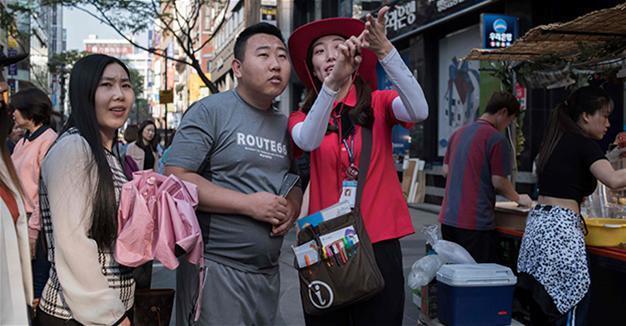Beijing’s new weapon in economic war: Chinese tourists
BEIJING - Agence France-Presse

Slapping import bans on products like mangoes, coal and salmon has long been China’s way of punishing countries that refuse to toe its political line.
But Beijing has shown that it can also hurt others by cutting a lucrative Chinese export: Tourists who normally flock to South Korea or Taiwan.
China’s recent boycott of South Korea over a U.S. anti-missile shield on the Korean peninsula signals a growing aggression in the way it flexes its economic muscles, analysts say.
Beijing has banned Chinese tour groups from going to the South, hammering its tourist market and the duty-free shops of retail giant Lotte Group, which has been targeted for providing land for the controversial defense system.
Dozens of Lotte stores were closed in China and protests held across the country as Beijing ramped up pressure on Seoul to abandon the Terminal High-Altitude Area Defense (THAAD) system, which it sees as a threat to its own military capability.
Lotte also suffered setbacks in several of its Chinese ventures -- from the government-ordered halt of a $2.6 billion theme park project to apparent cyberattacks on company websites.
“If you don’t do what Beijing’s political leaders want they will punish you economically,” said Shaun Rein, founder of Shanghai-based China Market Research Group.
“They put the economic vise on politicians around the world. They have been doing it for years and it works.”
85 pct drop in tourist numbers
Seoul-based tour operator Korea-China International Tourism has reported an 85 percent drop in tourists in recent months, which its founder attributes to China’s anger over THAAD.
The company usually receives 4,000 mostly Chinese visitors a month, but that has fallen to around 500 after Beijing warned tourists about the risks of travelling to the South, and ordered Chinese tour operators to stop sending groups there.
As the world’s second-largest economy and biggest trader, China can also inflict pain by blocking certain imports.
Norway learned that lesson the hard way. After the Oslo-based Nobel Committee awarded the 2010 Peace Prize to jailed Chinese activist Liu Xiaobo, China halted Norwegian salmon exports.
Relations only returned to normal in April after Oslo pledged its commitment to the one-China policy and respect for China’s territorial integrity.
Mongolia also incurred Beijing’s wrath in November when it allowed the Tibetan spiritual leader the Dalai Lama, who China views as a devious separatist, to visit the impoverished landlocked country.
Following the exiled Buddhist monk’s visit, China reportedly took punitive measures against Mongolia, including stopping trucks carrying coal from crossing the Chinese border -- a move with heavy repercussions for Mongolian mining concerns.
Tourism to Taiwan has also fallen sharply as relations across the strait worsen.
The Taipei Hotel Association reported decreases of up to 50 percent in Chinese visitors in recent months and warned “the situation could get worse”.
“I’ve been told by friends not to visit Taiwan since the cross-strait situation is tense but I am just a regular citizen so I am not too worried about that,” a 58-year-old Chinese man surnamed Liu said in a Taipei duty free shop.
Countries that submit to China’s demands, however, can find themselves rewarded.
Analysts expect China to become even more assertive as it seeks to fill the vacuum created by the U.S. retreat into “America First” policies promoted by President Donald Trump.
“Smaller nations (in Asia) don’t feel that Trump is going to support them,” said Rein.
But in the case of South Korea, Asia’s fourth-largest economy, Beijing has been careful to target specific sectors to avoid disruption that could backfire on Chinese companies.
“It has become a well-developed tool of diplomatic pressure,” said Andrew Gilholm, director of analysis of Greater China and North Asia at Control Risks.
 Slapping import bans on products like mangoes, coal and salmon has long been China’s way of punishing countries that refuse to toe its political line.
Slapping import bans on products like mangoes, coal and salmon has long been China’s way of punishing countries that refuse to toe its political line.